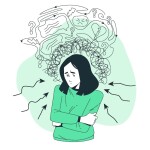Mastering the Mind: The Role of Sensory Control in Achieving Focus, Productivity, and Inner Peace
In today's fast-paced world, where distractions are but a click away, mastering the art of sensory control has become a necessity. From the constant buzz of notifications to the visual chaos of urban landscapes, our senses are perpetually bombarded, leaving little room for focus, productivity, and inner peace. But what if we have the power to control this bombardment of senses? What if we could take control over our sensory inputs to synchronize them with our goals and values? This blog delves into the significant role played by sensory control in supporting us to lead a much more balanced, fulfilling life.
What is Sensory Control?
Sensory control is the ability to control and manage the inputs that come through our five senses, namely sight, sound, touch, taste, and smell. It means being aware of how these inputs affect our thoughts, emotions, and behaviors. In a world where stimuli are plentiful and often overwhelming, sensory control allows us to filter out distractions and focus on what really matters.
Without sensory control, our impulses decide how we act. An overflowing inbox may cause us undue stress, or the constant chatter of a coffee shop may be causing disruption to deep work. We regain control over the mental state by managing those sensory triggers, opening us up to better decision making, enhanced productivity, and emotional stability.
Sensory Control and Focus
How Sensory Inputs Affect Attention
Our ability to focus is intimately tied to our sensory environment. The more overwhelmed our senses become, the less our brain is able to sustain attention. Imagine trying to focus on your work when the TV is blasting or when your phone just won't stop buzzing. Each of these sensory inputs requires cognitive resources, thereby dividing your attention and lowering efficiency.
Improving Focus Through Sensory Control
Clear up physical space. A cluttered work environment is likely to have a cluttered mind. Clarity in your environment reduces visual noise, enabling you to concentrate better.
Digital Hygiene: Avoid sensory intrusions from digital devices by silencing non-essential notifications, using "Do Not Disturb" modes, or installing apps that block distracting websites.
Creating a sensory-friendly environment: tools include noise-canceling headphones, soft lighting, and ergonomic furniture, among others.
Sensory Control and Productivity
How Overstimulation Affects Productivity
Overstimulation not only affects focus but also hampers productivity. When our senses are overloaded, it leads to decision fatigue, making even simple tasks feel arduous. The constant barrage of sensory inputs—emails, social media updates, or background noise—compels us to multitask, reducing the quality and efficiency of our work.
Strategies to Enhance Productivity Through Sensory Control
Boundary Setting with Sensory Triggers:
Designate times for checking your emails or scrolling through social media.
Utilize visual cues like "Do Not Disturb" signs to indicate the focus time to colleagues or family.
Task Prioritizing:
High-priority items are done in the early morning when sensory distractions are low.
Divide challenging tasks into smaller, easily managed steps to avoid overwhelming feelings.
Mindfulness Practices:
Practice mindfulness to ground yourself in the midst of sensory overload. Even a few seconds of focused breathing can sharpen your attention and reset your productivity levels.
Sensory Control and Inner Peace
The Relationship Between Sensory Regulation and Emotional Well-being
Inner peace is achieved by a clear mental state and an emotionally balanced state of being, which are the outcomes of our sensory life. Overstimulated senses create an overactive stress response. For instance, being constantly exposed to loud noises or bright screens can provoke irritation and restlessness.
Cultivating Inner Peace through Sensory Control
Yoga and Breathwork:
Engage in yoga postures and breathwork techniques to soothe the nervous system and reboot sensory overload.
Nature Therapy:
Spending time in natural environments reduces sensory stimulation and promotes relaxation. A walk in the park, listening to birds chirp, or feeling the grass underfoot can significantly lower stress levels.
Reducing External Stimuli:
Create tech-free zones at home to disconnect from the digital world and reconnect with yourself. Simple practices like reading, journaling, or meditating can foster tranquility.
Practical Ways to Develop Sensory Control
Achieving sensory control is a gradual process that does not happen overnight. Here are some actionable steps to get sensory regulation into your everyday life:
Mindfulness Practice:
Pay attention to your senses without judgment. Observe how different stimuli affect your mood and energy levels.
Use techniques like body scan or sensory grounding to bring awareness to the present moment.
Breathing Techniques:
Practice diaphragmatic breathing or alternate nostril breathing to anchor your mind and body amidst sensory chaos.
These techniques activate the parasympathetic nervous system, thus leading to the relaxation process.
Digital Detox:
Schedule tech-free hours or days to get rid of digital distractions. Use this time to take up hobbies, connect with loved ones, or unwind.
Sensory Diet:
Just like one needs a well-balanced diet to nourish the body, a well-balanced sensory diet nourishes the mind. Limit time spent in overstimulating environments and encourage calming activities.
Routine Life:
Create regular routines within your daily lives to alleviate decision fatigue and sensory overwhelm. For example, dedicate your mornings to mindful tasks such as meditation or journaling.
It's no luxury; it is a necessity: learn to master your senses amidst these distractions in the sensory-driven world. Regulating your sights, sounds, textures, flavors, and scents will make you focused once again, productive again, and in peace of heart. Starting small: learning how to control one's senses can begin in clearing up a workspace, some deep breathing, or an hour of being in nature.
Finally, sensory control gives a human the capability to transcend the mess of modern society and walk in the clarity and coolness of mind. The old saying says that "One who masters others is efficient; one who masters self gets real power." Try it today.
Solh understands. We offer a variety of features to help you dealing with Chaos in Life:
Prarambh Life De-addiction : Prarambh Life De-addiction Program Prarambh Life De-addiction program is an organized attempt at breaking free from substance dependency. The program, therefore not only helps in the recovery but also in building mental well-being by teaching healthy coping mechanisms and developing a friendly environment. With personalized counseling, mindfulness practice, and holistic focus on mental wellbeing, Prarambh rebuilds the lives of individuals, full of resilience and newfound purpose.
Streffie : Streffie, a unique feature by Solh Wellness, empowers individuals to track and analyze their moods using a vibrant palette of expressive emojis. By scanning your face, it provides real-time insights into your stress levels, enabling you to uncover depression triggers, recognize patterns, and make necessary adjustments for emotional balance. Streffie acts as a self-awareness tool, helping individuals identify early signs of emotional shifts, understand stress contributors, and take proactive steps toward managing depressive episodes through informed communication.
Journaling for Self-Reflection: At times, not taking care of oneself is not understanding oneself. Solh's journal feature gives you the room to voice your thoughts and emotions. Reflecting on experiences and desires is like finding out what holds you from self-care.
Anonymous Support Groups: You are not alone. Solh's anonymous support groups of stress connect you to others who know exactly what the hassle is all about. Share your experiences, find comfort in solidarity, and discover new perspectives on overcoming the hurdle to indulge in self-care.
Solh Buddy: Ever feel completely lost in the woods or utterly disconnected? Your Solh Buddy is here for you-personalized, virtual support. It can give you prompts, celebrate your wins, and remind you of your strengths as you journey toward self-care.
Talk now: Sometimes dealing with stress and anxiety can be overwhelming. With the Talk Now feature in Solh, access counselors who will walk you through those moments.








